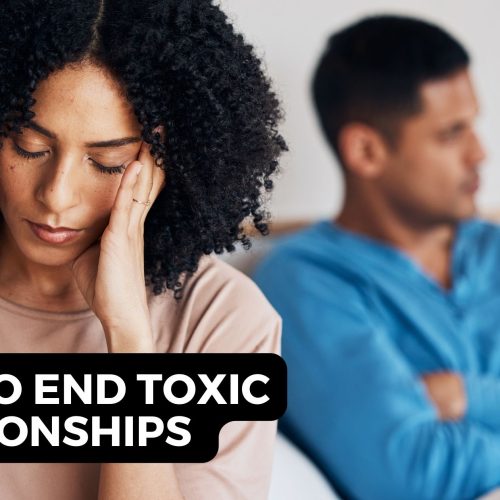Table of Contents
ToggleA Guide to Healing and Safety
Toxic relationships can be emotionally exhausting, spiritually draining, and sometimes physically dangerous. Whether it’s manipulation, emotional abuse, or even violence, poisonous relationships rob you of your peace, purpose, and potential. It’s not easy to walk away, but doing so is often necessary for your mental, physical, and spiritual health.
Using wisdom, rooted in both practical steps and biblical guidance, is essential to safely and effectively end a toxic relationship. In some cases, toxic individuals may become violent or pose a serious threat to your well-being, which requires extra caution and careful planning. This guide will help you not only recognize when it’s time to leave but also offer strategies for doing so safely, leaning on wisdom for healing and protection.
Acknowledge the Signs of a Toxic Relationship
Before you can take action to end a toxic relationship, you must first acknowledge that the relationship is harmful. Often, we try to justify toxic behaviors or minimize their impact because we fear being alone or we hope the other person will change. However, wisdom calls for an honest assessment of the relationship.
Here are some common signs of a toxic relationship:
- Emotional Manipulation: The person may use guilt, threats, or emotional blackmail to control your behavior.
- Lack of Respect: There is little regard for your boundaries, feelings, or opinions.
- Verbal Abuse: Constant criticism, insults, or belittling comments are a form of abuse.
- Physical Abuse: Any form of violence, whether it’s hitting, pushing, or threatening physical harm, is a clear sign the relationship is dangerous.
- Isolation: The person may try to isolate you from friends, family, or support systems.
- Constant Negativity: You feel emotionally drained or anxious after spending time with this person.
Once you recognize these patterns, it becomes clear that remaining in this relationship is harmful. Proverbs 14:8 reminds us that “The wisdom of the prudent is to give thought to their ways,” meaning we must carefully evaluate the paths we are on—including our relationships.
Seek Wise and Trusted Counsel
Navigating a toxic relationship can be confusing, and you may feel emotionally overwhelmed. In such times, seeking wise counsel from trusted friends, family, mentors, or spiritual leaders is essential. These individuals can offer objective insights and guide you in making the best decision for your well-being. Proverbs 11:14 says, “Where there is no counsel, the people fall; but in the multitude of counselors, there is safety.”
Be honest with your support system about the dynamics of the relationship. Sometimes, toxic individuals try to make you believe that you are the problem or that their behavior is justified. Having a trusted confidant helps you see things clearly, and they can also assist you in formulating a plan to leave safely if necessary.
Create a Safety Plan if the Relationship is Dangerous
For some, leaving a toxic relationship is more than just an emotional decision—it’s a matter of physical safety. If you’re in a relationship where violence is present or likely, creating a safety plan is crucial. Here are steps you can take to ensure your safety while ending the relationship:
- Reach Out to a Domestic Violence Hotline: If you fear for your safety, contact a local or national domestic violence hotline. They can provide you with resources, support, and advice on how to leave safely. In the U.S., the National Domestic Violence Hotline is 1-800-799-SAFE (7233).
- Prepare an Emergency Bag: Pack a bag with essentials such as money, identification, medications, clothes, and important documents (birth certificates, passports, etc.). Keep this bag in a safe place where the toxic person cannot find it.
- Inform Trusted People: Let trusted friends or family members know about your plan to leave and give them any necessary information (such as your location, a safe word for emergencies, etc.). Keep someone always informed about your whereabouts, especially during the process of leaving.
- Plan for a Safe Exit: If possible, leave when the toxic person is not around, or enlist the help of a trusted friend, family member, or even law enforcement if necessary. Never confront a violent person alone when leaving—this can escalate the situation.
- Change Your Routine and Secure Your Privacy: After leaving, change up your daily routine to avoid encounters with the toxic person. Update privacy settings on social media, and block the individual from contacting you through phone or email. If necessary, consider changing your phone number.
Set Boundaries with Compassion and Firmness
Even when leaving a toxic relationship, wisdom teaches us to do so with compassion, especially if there are children involved or if the relationship is complex. However, being compassionate doesn’t mean you have to compromise your safety or well-being.
Setting firm boundaries is essential. This may include cutting off all communication, especially if the person is manipulative or abusive. If you need to maintain some contact (such as for co-parenting), establish clear guidelines for communication, such as only speaking through a mediator or keeping conversations limited to necessary topics.
Remember that setting boundaries is an act of self-respect. It shows that you value yourself enough to protect your peace. As the Bible says in Matthew 10:16, “Behold, I send you out as sheep amid wolves. Therefore, be wise as serpents and harmless as doves.” It’s possible to remain kind while still protecting yourself from harm.
Prioritize Your Well-Being and Healing
Toxic relationships take a toll on your mental, emotional, and spiritual health. Once you’ve left, it’s crucial to prioritize your well-being and focus on healing. This process may involve counseling or therapy, joining a support group, or dedicating time to self-care.
Here are a few ways to prioritize your healing:
- Seek Professional Help: A therapist or counselor can provide you with tools to cope with the emotional fallout of a toxic relationship. They can help you process feelings of guilt, anger, sadness, and fear that may linger even after you’ve left.
- Nurture Your Spiritual Health: Reconnect with God through prayer, Bible study, and meditation. Spending time in the Word can help you find peace and comfort. Philippians 4:6-7 reminds us, “Do not be anxious about anything, but in every situation, by prayer and petition, with thanksgiving, present your requests to God. And the peace of God…will guard your hearts and minds in Christ Jesus.”
- Engage in Activities That Bring You Joy: Rediscover activities that bring you happiness. Whether it’s a hobby you abandoned during the toxic relationship or something new you’ve always wanted to try, permit yourself to find joy again.
- Practice Gratitude and Mindfulness: These practices can shift your focus from the pain of the past to the blessings of the present. Focusing on gratitude helps you develop a positive mindset, which is essential for your healing journey.
Forgive, But Don’t Forget to Protect Yourself
Forgiveness is a powerful act of wisdom. It frees you from the burden of anger, resentment, and bitterness. However, forgiveness does not mean you must reconcile or allow the toxic person back into your life. In some cases, keeping your distance is necessary for your safety and well-being.
As Colossians 3:13 teaches, “Bear with each other and forgive one another…Forgive as the Lord forgave you.” Forgiveness is an act of grace, but wisdom also teaches us to protect ourselves from further harm. If the person has demonstrated patterns of abuse or manipulation, forgiving them does not require giving them a second chance to hurt you.
Lean on God’s Strength and Trust in His Plan
One of the most difficult aspects of leaving a toxic relationship is the uncertainty that follows. You may feel alone, fearful of the future, or unsure of whether you made the right choice. In these moments, lean on God’s strength and trust in His plan for your life.
Isaiah 40:31 reassures us that “those who hope in the Lord will renew their strength.” Rely on God’s promises and remember that He has a future filled with hope and peace for you. Jeremiah 29:11 reminds us, “For I know the plans I have for you…plans to prosper you and not to harm you, plans to give you hope and a future.”
By trusting in God’s plan, you can find peace and comfort in knowing that leaving a toxic relationship is not the end—it’s the beginning of a new chapter filled with healing, growth, and the potential for healthier relationships in the future.
Rebuild Your Life and Embrace New Beginnings
After leaving a toxic relationship, there will be moments when you feel uncertain about what lies ahead. However, this is also an opportunity to rebuild your life, rediscover your passions, and embrace new beginnings.
Take time to reflect on what you’ve learned from this experience. How has it strengthened your faith? What wisdom have you gained about yourself and your relationships? Use this time to focus on personal growth, setting new goals, and seeking out relationships that are healthy, supportive, and grounded in love and respect.
God is a God of restoration. No matter how broken you may feel after leaving a toxic relationship, trust that He can heal your heart, restore your spirit, and lead you into a brighter future.
Mental Health Impacts of Toxic Relationships
Being in a toxic relationship can severely impact your mental health, leading to anxiety, depression, low self-esteem, and even trauma-related disorders. Emotional abuse, manipulation, and constant stress can cause long-term damage to your sense of self-worth and well-being. It’s essential to recognize these signs and seek help when needed. In extreme cases, a toxic relationship can lead to PTSD or require therapy to heal from the emotional wounds.
To learn more about how toxic relationships affect mental health, here are some helpful resources:
- National Alliance on Mental Illness (NAMI) – Mental Health in Toxic Relationships
- Psychology Today – The Psychological Effects of Toxic Relationships
- Mayo Clinic – Coping with the Emotional Impact of Abusive Relationships
These resources provide valuable insights into the mental health implications of staying in a toxic relationship and offer guidance on how to seek support for recovery.






